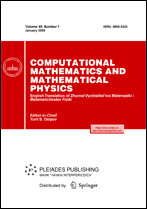|
|
Zhurnal Vychislitel'noi Matematiki i Matematicheskoi Fiziki, 2011, Volume 51, Number 6, Pages 1148–1165
(Mi zvmmf9469)
|
 |
|
 |
This article is cited in 4 scientific papers (total in 4 papers)
Gradient stability of numerical algorithms in local nonequilibrium problems of critical dynamics
P. K. Galenkoa, V. G. Lebedevb, A. A. Sysoevab
a Institute of Material Physics in Space, German Aerospace Center (DLR), D-51170 Cologne, Germany
b Udmurt State University, Universitetskaya ul. 1, Izhevsk, 426034 Russia
Abstract:
The critical dynamics of a spatially inhomogeneous system are analyzed with allowance for local nonequilibrium, which leads to a singular perturbation in the equations due to the appearance of a second time derivative. An extension is derived for the Eyre theorem, which holds for classical critical dynamics described by first-order equations in time and based on the local equilibrium hypothesis. It is shown that gradient-stable numerical algorithms can also be constructed for second-order equations in time by applying the decomposition of the free energy into expansive and contractive parts, which was suggested by Eyre for classical equations. These gradient-stable algorithms yield a monotonically nondecreasing free energy in simulations with an arbitrary time step. It is shown that the gradient stability conditions for the modified and classical equations of critical dynamics coincide in the case of a certain time approximation of the inertial dynamics relations introduced for describing local nonequilibrium. Model problems illustrating the extended Eyre theorem for critical dynamics problems are considered.
Key words:
gradient-stable numerical methods, irreversible thermodynamics, structure formation.
Received: 12.10.2010
Citation:
P. K. Galenko, V. G. Lebedev, A. A. Sysoeva, “Gradient stability of numerical algorithms in local nonequilibrium problems of critical dynamics”, Zh. Vychisl. Mat. Mat. Fiz., 51:6 (2011), 1148–1165; Comput. Math. Math. Phys., 51:6 (2011), 1074–1090
Linking options:
https://www.mathnet.ru/eng/zvmmf9469 https://www.mathnet.ru/eng/zvmmf/v51/i6/p1148
|


| Statistics & downloads: |
| Abstract page: | 327 | | Full-text PDF : | 99 | | References: | 50 | | First page: | 15 |
|





 Contact us:
Contact us: Terms of Use
Terms of Use
 Registration to the website
Registration to the website Logotypes
Logotypes








 Citation in format
Citation in format 
